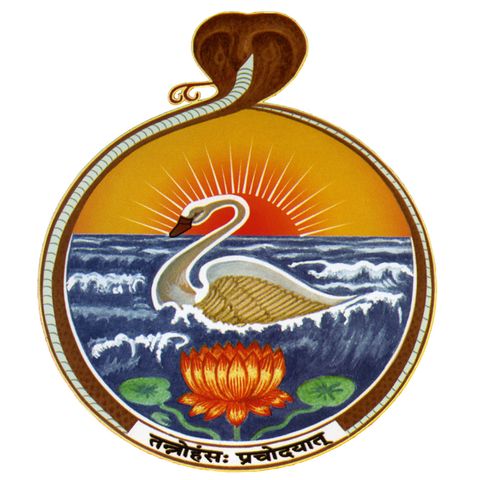Swami Vivekananda on Education: Harmonizing the Secular and the Spiritual | Swami Tattwamayananda

Sign up for free
Listen to this episode and many more. Enjoy the best podcasts on Spreaker!
Download and listen anywhere
Download your favorite episodes and enjoy them, wherever you are! Sign up or log in now to access offline listening.
Description
This lecture was given on June 28, 2019 at the Vedanta Society of Northern California by Swami Tattwamayananda. - Swamiji admired the merits of modern western secular educational system, like...
show more- Swamiji admired the merits of modern western secular educational system, like its emphasis on humanism, innovation, human rights, egalitarian and democratic values, utilization of science and technology, etc.
- Swami Vivekananda's positive approach and constructive criticism of the Western and Eastern models of education; a harmony of the positive elements of both.
- Education for evolving healthy social and political institutions.
- Civilizations, like individuals, go through the successive stages of birth, adolescence, decay and destruction
- Two approaches to social transformation:
(a) Evolution, which is a natural constructive growth from within and,
(b) Revolution, which is unnatural, often destructive and is a change imposed from outside
- He recommended a harmonious blending of the very best of the secular modern, Greco-Roman, Western, scientific and technological values and the best of Eastern, traditional and spiritual values.
- Vivekananda's most well-known definition of education was this: "Education is the manifestation of perfection already in man."
-Education should be for character building, nation building, and man making, training of the whole personality.
-Swami Vivekananda says, “You cannot teach a child any more you can grow a plant, all you can do is on the negative side. You can only help. You can take away obstacles but knowledge comes out of its own nature. Education should involve training in spiritual and cultural values. Swamiji’s definition: “We must have life-building, man-making, character-building assimilation of ideas.”
-Education in practice implies removing the obstacles that stand in the way of unfoldment of perfection already in all of us.
-Such an education should make us sensitive to the needs of the society in which we live and we become sensitive to our own obligations to our fellow beings living around us.
- Swamiji's reference to the transformative impact on the conditions of the Irish migrants who came to America in the 19th-century
-The best of Realism and the best of Idealism.
-This would be the foundation of an ideal educational system.
- Swamiji’s criticism of placing too much emphasis on secular values to the exclusion of the spiritual ideals.
- Swamiji says, "All knowledge is inherent in man." (He refers to Newton's discovery of gravitation)
-According to religion, interpreted and understood as spirituality should be the 'core subject' of education. (in contrast to some of the views advocated by Western educational thinkers like J.F. Herbart, Froebel, John Dewey. etc.)
- But Swamiji was in full agreement with some of these Western thinkers in totally rejecting John Locke's theory of 'tabula rasa', though this view goes back some of the ancient Greek philosophers.
- Integrating some of the values of ancient Indian education with modern educational system: the 'GURUKULA' system:
- An ancient convocation address from the Vedic period: " मातृदेवो भव । पितृदेवो भव । आचार्यदेवो भव । अतिथिदेवो भव ।" (तैत्तिरीयोपनिषत्)
- Nature, the great educator
- Stress on family values: the sacredness and sanctity of the institution of the family, like respect to the parents, teachers, guests, etc.
- Evolution of education: from information to knowledge to wisdom to 'Prajna'
- आचार्यात् पादमादत्ते पादं शिष्य स्वमेधया |
पादं सब्रह्मचारिभ्य: पादं काल क्रमेण च ||
- Managing the fruits of education
- "I learn as long as I live"
- The importance of श्रद्धा in education
- Sanctity and sacredness of the spoken word; need for moderation in speech and choice of the vocabulary.
-It should not promote national fanaticism. It should inculcate constructive and creative patriotism based on humanistic values: वसुधैव कुटुम्बकम्
- Education should emphasize humanities, (study of language, literature, history philosophy, art, religion etc.) along with science and technology.
- Poet Kalidasa on moderation in the use of spoken words: मितं च सारं च वचो हि वाग्मिता । (attributed to the ancient Sanskrit poet Kalidasa)
(True eloquence is the correct, concise and meaningful use of words)
- An illustration from Valmiki's Sanskrit classic Ramayana: Hanuman's eloquence:
- The glorious examples of the American transcendentalists
- An illustration of the invocation the Goddess of learning in the ancient Gurukula system of education
Information
| Author | Vedanta Society, San Francisco |
| Organization | Vedanta Society, San Francisco |
| Website | - |
| Tags |
Copyright 2024 - Spreaker Inc. an iHeartMedia Company
